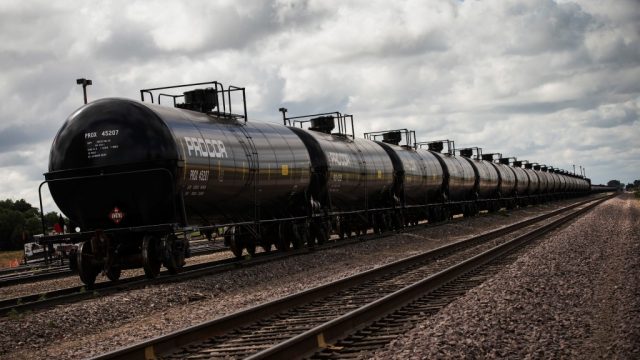Bakken Oil Is Well Within Federal Guidelines For Transport

A spate of train derailments recently, some of them explosive, has people worried about all those oil trains traveling through our communities. And for good reason. Nobody wants an explosion in their community.
But the concern has turned into an unfair singling out of Bakken crude, with some suggesting that the oil from this region is abnormally flammable. The Center for Biological Diversity has cited “highly flammable Bakken crude” in their call for a moratorium on shipping oil by rail. The Sierra Club has cited Bakken crude in suggesting that oil by rail shipments are “dangerous to communities.” An anti-fracking activist has started referring to “shale oil bomb trains,” and the National Resources Defence Council was positively delighted when oil train terminals in Washington were blocked.
Clearly, these anti-fossil fuel groups are twisting these train derailments into a war on oil. Specifically, North Dakota oil.
There’s a problem, though, and it’s called “the facts.”
A new independent study commissioned by the industry finds that Bakken crude is well within federal parameters for transporting oil by rail.
You can catch up on the specifics of the report here. It was produced by Turner, Mason & Company, and it was done at the request of the North Dakota Petroleum Council. What it found is that Bakken crude “poses no greater risks than other flammable liquids authorized for rail transport.”
I made a similar point recently when I noted that, until last year, ethanol-by-rail shipments far outnumbered oil by rail shipments. And, like oil rail shipments, sometimes ethanol trains have derailed and exploded. Like this incident in Ohio. Or this one in Illinois.
Yet, when oil trains have derailed and exploded there wasn’t a national call to stop producing ethanol. Or to stop shipping it by rail. Instead, there was a debate about rail car safety.
And there’s the rub.
The issue with these derailments isn’t what is being transported on the trains, but rather why the trains themselves derail and why the tanker cars that make up the train are rupturing upon derailment.
Put simply, it’s not an oil problem. Or an ethanol problem. It’s a rail car problem, as this 2013 report from television station WKYC illustrates:
…safety advocates are sounding a warning over the type of rail car commonly used to transport products like crude oil and ethanol. They may have some serious safety flaws. …
The DOT-111 has been called the “workhorse” of the American tanker car fleet. These non-pressure tanks make up roughly 69 percent of U.S. tank cars according to National Transportation Safety Board. They have been in use for decades and are recognizable for their soda can shape.
But five times in 20 years, the NTSB has warned the DOT-111′s design is unsafe.
Specifically, in collisions and derailments their steel shell is vulnerable to puncture, fittings on top can rupture on impact, and the tanker’s ends are prone to damage.
For decades now safety advocates have been raising questions about the DOT-111 tanker car, and nothing has been done. But now that “big oil” is leaning heavily on rail shipping to bring booming domestic shale oil production to market, suddenly the shipments are the issue.
That’s…convenient, no?
Rail car safety needs to be addressed. We also need to build out other infrastructure (like, you know, the Keystone pipeline) to take the pressure off rail.
But the one thing we don’t need to do is stop pumping oil. The oil isn’t the problem.




